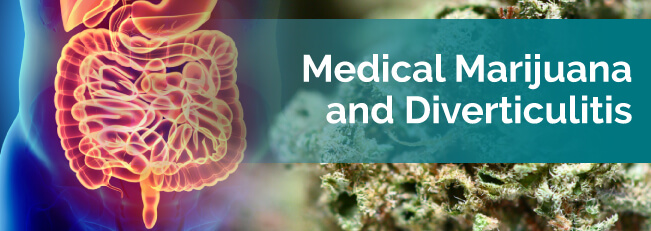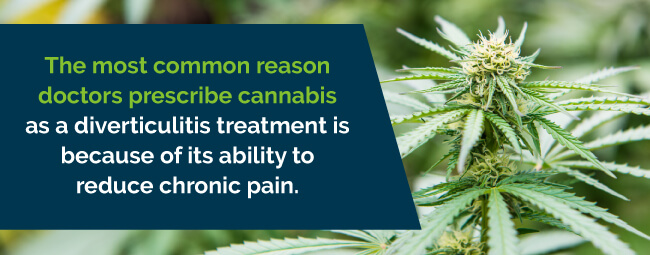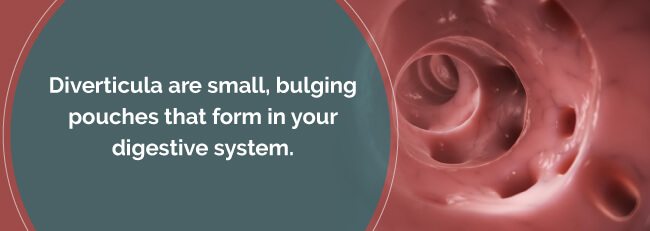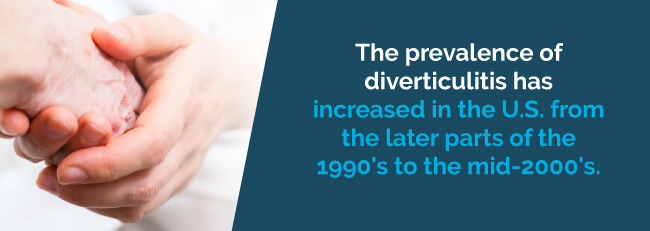
Many people seek out marijuana for relief from everything from chronic pain to gastrointestinal distress. And there is plenty of evidence, as you will see, that this miracle herb helps to relieve your nausea, calm your bowels and even increase your appetite. Because of these properties, it’s ideal for treating the symptoms of diverticular disease.
The endocannabinoid system (ECS) works like an orchestra conductor. It triggers multiple biochemical interactions through various signal messages. Many of the interactions it triggers occur between your immune system, brain, and gut.
Your gastrointestinal (GI) tract holds around 80 percent of your immune system. You have cannabinoid receptors in your GI tract. Research shows the digestive system contains high endocannabinoid levels.
Find A Doctor Find A Dispensary

The precise function endocannabinoids have in your gut requires further research. But, it appears the ECS plays a variety of roles in your GI tract, including:
You’ll find both the CB1 and CB2 receptors in your gut. The psychoactive high you experience with THC is due to your CB1 receptor. The CB1 receptor, although more plentiful in your central nervous system, also appears on the nerves connecting your gut to your brain.
One 2008 review suggests that in a healthy gut, CB2 receptors aren’t as plentiful. In bowel diseases and with an inflamed GI tract, however, CB2 receptor levels increase. Your immune cells contain the CB2 receptor.
Since CB2 receptors increase in sickly or damaged intestines, this is a good indicator cannabinoid therapy can be helpful to those with gastrointestinal disease.
A 1999 study conducted by the Institute of Medicine found that, after nausea and vomiting, chronic pain was the condition most often cited as a medical use for marijuana. Although research into the use of medical marijuana has been limited, much of the study has focused on its application to control nausea and vomiting in cancer patients. Those studies have overwhelmingly concluded medical marijuana is a valid treatment option for patients suffering from loss of appetite, nausea, and vomiting. Diverticulitis sufferers, therefore, may achieve relief from these symptoms with the use of medical marijuana.
Studies of the effectiveness of medical marijuana as a pain reliever have also concluded medical marijuana can be used to reduce the amount of opiate-based pain medication while still providing pain relief.
Medical marijuana also contains Cannabidiol, or CBD. CBD is an essential component of cannabis, which has been shown to have anti-inflammatory properties. Along with CBD, medical marijuana also contains a compound known as ß-caryophyllene. Both these compounds have been found to reduce tissue inflammation which may be beneficial to anyone suffering from diverticulitis.
Medical marijuana is now being used to treat diverticulitis. Diverticulitis can be extremely painful. While some people only experience a short bout of diverticulitis, others suffer from the condition for weeks, months or years.
Over-the-counter pain medications may not be able to control the pain experienced by the patient. While opiate-based pain medications may help with the pain, they also come with a host of potentially harmful side effects and risk for overdose, dependency, and addiction. Also, opiate based pain relievers can cause constipation or impacted bowels, which may make the diverticulitis worse.
Thanks to its two primary cannabinoids, cannabidiol (CBD) and tetrahydrocannabinol (THC), medical marijuana can effectively curtail pain and reduce chronic inflammation linked with inflammatory-related diseases.
The most common reason doctors prescribe cannabis as a diverticulitis treatment is because of its ability to reduce chronic pain. It reduces swelling, inflammation, sore muscles and tension, making it a useful treatment for those suffering from debilitating pain.

Medical marijuana has a long history of use as an analgesic. Along with its analgesic properties, medical marijuana also helps patients who are suffering from loss of appetite, nausea or vomiting by stimulating the appetite and reducing the feeling of having to throw up.
Medical marijuana may also be able to help reduce the inflammation caused as a result of diverticulitis. Conventional over-the-counter or prescription anti-inflammatory medications can also lead to irritation or damage to the lining of the stomach or liver, which medical marijuana does not cause.
And, while both CBD and THC show effective anti-inflammatory response, the manner in which they go about it varies. Both cannabinoids release and decrease pro-inflammatory cytokines and reduce the LPS-induced STAT1 transcription factor activation, which is a primary component in part of the pro-inflammatory process. CBD also helps with the anti-inflammation process. It suppresses fatty acid amidohydrolase activity which leads to more concentration of anandamide, the anti-inflammatory endocannabinoid.
Besides pain and inflammation, individuals with diverticulitis also turn to medical cannabis for help with sleep, anxiety, depression, nausea, and appetite.
If you’re one of the lucky people who have access to a medical marijuana-friendly physician, they may point you in the right direction to specific marijuana for diverticulitis strains or products. But, most medical weed patients realize they need to conduct some experimenting on their own before they find the perfect strain. When selecting the best strain, there are a few variables to consider.
A couple of main variable groups to consider when deciding on your quality cannabis choice are strain classification and cannabinoid content.
Strains are classified into three broad groups:
The other variable to take into consideration is cannabinoid content. Although the majority of individuals instantly think of a psychoactive, sleepy high when they hear the term weed, various strains can produce extremely varied effects. Some strains don’t give you a psychoactive effect at all.
CBD and THC are the two most abundant cannabinoids in medical cannabis for diverticulitis. THC is the plant’s main psychoactive cannabinoid and is responsible for the “high” you get from marijuana. CBD is nonpsychoactive, although it still has a positive effect on people’s moods.
For growers to label a strain high in CBD, it must make up more than 20 percent of it. Depending on environmental and genetic factors, you may find some strains with almost a 1:1 or 2:1 CBD to THC ratio.
Many individuals prefer a 1:1 ratio. These strains are not overwhelming but still provide slight psychoactivity. When the two cannabinoids work together synergistically, they may enhance each compound’s effects.
Going back over the symptoms of diverticulitis, you learned it causes:
These are all symptoms medical cannabis can treat effectively. So, your next step is to find the strain or strains to help you with the diverticulitis side effects you’re experiencing.
Strains to help fight pain include:
Good strains for constipation include:
Strains to help with diarrhea include:
Strains to relieve nausea include:
Strains for inflammation include:
There are thousands of marijuana strains. So, you need to experiment and work with your physician and local dispensary budtender to find the right strain or combination of strains to work best for your diverticulitis symptoms.
Now, your next question may be what your ideal way of consuming medical marijuana is. Cannabis comes in various forms, including edible, dried or oil form. Your personal preference and lifestyle will determine how you take your medical weed. Some popular methods include:
So, you’ve made up your mind and have done careful research on medical cannabis. You’re now ready to give it a shot. What’s next? You’ll need to search for a medical marijuana dispensary or doctor first. This will help you find a licensed medical cannabis doctor so you can get your recommendation. You’ll then search for the perfect dispensary to obtain your treatment.
Remember, like all life decisions, choosing to start medical marijuana is a big one. Therefore, don’t take it lightly. Do your research to learn more about the treatment and the best options available to you.
Find A Doctor Find A Dispensary
Diverticula are small, bulging pouches that form in your digestive system lining. Diverticulosis refers to the condition of having these pouches. Diverticula pouches reside in your colon, the lower part of your large intestine. They’re common, particularly if you’re over 40 years old, but they typically don’t cause too many issues.

On occasion, these pouches can get infected or inflamed. When your diverticula pouches become inflamed or infected, you have diverticulitis. This condition may cause nausea, fever, severe abdominal pain and a noticeable change in your bowel habits.
Changes in your diet, rest and antibiotics are usually all you need to treat mild diverticulitis. However, for recurring or severe diverticulitis, you may need surgery.
Professionals aren’t sure what causes diverticulitis and diverticulosis. Several factors researchers are studying could be a causal element of these conditions. Some include:
Genes: Some studies suggest people are more prone to diverticulitis and diverticulosis because of their gene makeup. However, researchers are continuing to study how heredity and your genetic makeup play a role in these conditions.
Other Factors: Studies show associations between diverticular disease-causing issues like diverticular bleeding and the following factors:
Diverticulitis can start with trapped stool or bacteria in a pouch inside your colon. Both an increase in unhealthy bacteria and a decrease in healthy bacteria in your colon can cause diverticulitis.
There are several types of diverticular diseases your doctor may diagnose you with. These include:
Diverticular disease is a condition that became common in both the 20th and 21st centuries. A French surgeon, Alexis Littre, first described the disease in the late 1700s. Fleischman referred to it as divertikel in 1815. Klebs, in 1869, was the first to associate diverticula development with constipation. In 1899, Graser described diverticula inflammation — diverticulitis.
The prevalence of diverticulitis has increased in the U.S. from the later parts of the 1990’s to the mid-2000’s.

The inflamed pouches accompanying diverticulitis may — and often do — cause pain in the lower left side of your abdomen. It can occur suddenly and be severe. But, it can also start off mild and progress in severity over a several day span. Over time, the pain intensity can also change.
Individuals can also experience impacts of their mental health because of having diverticulitis. UCLA researchers found individuals who have diverticulitis higher risk (four-fold) of developing irritable bowel syndrome (IBS). Subjects also had depression and anxiety for an extended period following the attack. The UCLA study included an examination of over 1,000 records from patients of West Los Angeles Veteran’s Affairs Medical Center over a two-year period.
In this research, individuals claimed they were experiencing anxiety, fear, and depression. They said the condition labeled them. They also said they are always living in fear, felt socially isolated and were scared of travel due to worrying about having another diverticulitis attack.
Facts about diverticular disease as reported by the National Institute of Health (NIH) are:
According to the American Society of Colon and Rectal Surgeons (ASCRS):
Traditional treatment methods for diverticulitis depend on the severity of the condition. If an infection is present, physicians prescribe antibiotics. A liquid diet may be necessary as well. Doctors also commonly prescribe heat, pain medication and relaxation. In severe cases, surgery may be required to remove a bowel obstruction, fistula or abscess, or when the patient is suffering from chronic pain as a result of the diverticulitis.
The treatment you receive for diverticulitis depends on your symptoms and their severity.
If you have mild symptoms, you may receive your treatment at home. Your physician will probably prescribe you:
This treatment is a success for around 70 to 100 percent of individuals with uncomplicated diverticulitis.
Side effects of antibiotics include nausea, vomiting, lack of appetite, bloating and constipation. If you take more than recommended, acetaminophen can cause liver damage.
Your doctor will likely admit you to the hospital for a severe attack and other health issues related to complicated diverticulitis. Treatment typically includes:
Your doctor will likely recommend surgery to treat your case of diverticulitis if you:
Only about one percent of people who have diverticulosis will need surgery, according to ASCRS.
The primary types of surgery for diverticular disease include:
As with any surgery, there are side effects and risks, including contracting an infection and having pain. Narcotics prescribed for post-surgery pain can lead to addiction.
After recovering from diverticulitis, your doctor might suggest a colonoscopy, especially if in the previous year, you didn’t have the test done. There’s no evident link between rectal or colon cancer and diverticular disease. However, a colonoscopy can rule out colon cancer as being the cause of your symptoms.